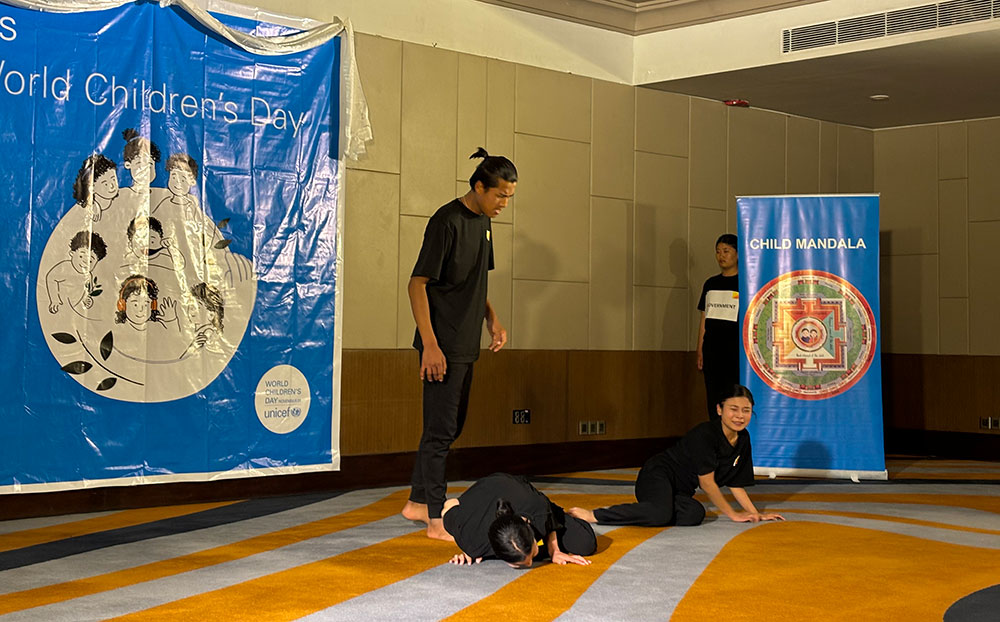Yangyel Lhaden
Prelude
It is International Children’s Day. UNICEF is hosting a reception dinner.
The Black Box Theatre, a group of youth, presents a play called “Dream”. In the background plays a happy music.
ACT I
Wangmo, light and lively, walks in. “Hello, everyone! I am Wangmo. I have a dream. My dream is…My dream is…”
She breaks down.
As the music changes, Wangmo’s mother walks in to support her. Then comes her stepfather, telling Wangmo that she does not have the right to dream. He shoves both Wangmo and her mother aside.
The desperate mother walks around the audience, asking for help to save her daughter.
And the music changes, once again. Four artists with the tags education, health, government, and skills walk in, moving their hands in the air, energising the crowd.
Artists with UNICEF T-shirt surround Wangmo and her mother along with health, government, skills, and education. Wangmo and her mother get up.
In comes another dreamer. His name is Norbu.
“Hello, I am Norbu. I have a dream, and my dream is… my dream is…”
He stammers, his voice cracks, his hands shake, and then he collapses on the ground with his hand on his head, screaming.
Norbu’s single mother walks in. She tries to help her son, but he pushes her away. Desperate, she goes around the guests, pleading for help.
Then come the agencies, swinging their hands. Everyone is happy, but slowly from the back, UNICEF collapses first, then government, health, education, and skills collapse, followed by parents and, then, children.
After a moment of silence, it is His Majesty The King’s speech. Slowly, everyone gets up.
In full spirit, Wangmo says: “Hello everyone! I am Wangmo. I have a dream, and my dream is to become a teacher.”
Norbu: “Hello everyone! I am Norbu. I have a dream, and my dream is to be an artist.”
Wangmo and Norbu then go to the audience, asking, “What is your dream?”
“Attention everyone! Everyone has a dream, right? What is your dream, sir?”
“My dream is to fulfill your dream,” a holler from the crowd.
“How about you, sir?”
“‘I have a dream, and my dream is to become a filmmaker,” comes the answer from the audience.
Wangmo and Norbu look at each other and then say, “AND…”
A blind person walks in. Wangmo and Norbu help him. “And, to be a good human being…”
ACT II
Dawa Tshering, 21, the director of the play, wanted to create a production that is simple, and easy for the audience to understand. The crew must be able to express themselves fully.
“Dream is everything; without a dream, you cannot do anything,” Dawa said.
Norbu distances himself from his mother despite support from agencies.
“The aim is to highlight the futility of it all if youth do not seize the opportunity,’ says Dawa. “It is a reflection of how complaints about a lack of chances remain, even when programmes such as skills development and de-suup skilling programmes are readily available.”
The play shows that the government seeks to work with UNICEF to complement the government’s efforts in addressing the critical issues facing the nation and its citizens. If UNICEF fails, the government also fails naturally.
What happens to parents and youth then?
“Being Bhutanese, our King is our inspiration, and during challenging times, our King’s speeches motivate everyone to work harder,” says Dawa.
ACT III
Five youngsters are seated among the audience.
“The play was very powerful and portrayed the lives of children in the most relatable ways, especially for the young,” says a mother. “Our children need a better world.”
“What’s your dream?” asks one parent in the audience.
“It is not easy to share my dream,” says Pema Lhamo, 18, a student. “The play was powerful because I could relate, but I cannot share my dream. I am afraid of rejection, disappointment, and the prevailing social views.”
Pema Lhamo has never shared her dreams with her parents. “I do not want to give them false hope.”
Kencho Tenzin, 19, wants to become an IT engineer. He has not had the courage to share his dream with his parents. “I suffered alone. I do not want to shatter the expectations of my parents.”
Kencho Tenzin has come to terms with his dreams. “I now have accepted my fate and am pursuing electrical engineering at the College of Science and Technology.”
And, likewise, Tshewang Rigzin, 21, wants freedom for every Bhutanese child. “My parents separated and I spent most of my childhood with my relatives. Freedom is precious.”
Chokey Gyeltshen, 20, has been a goalkeeper for the last 13 years. “My teammates do not trust me because I am short.”
“Trust is very important for personal growth,” says Chokey Gyeltshen.


